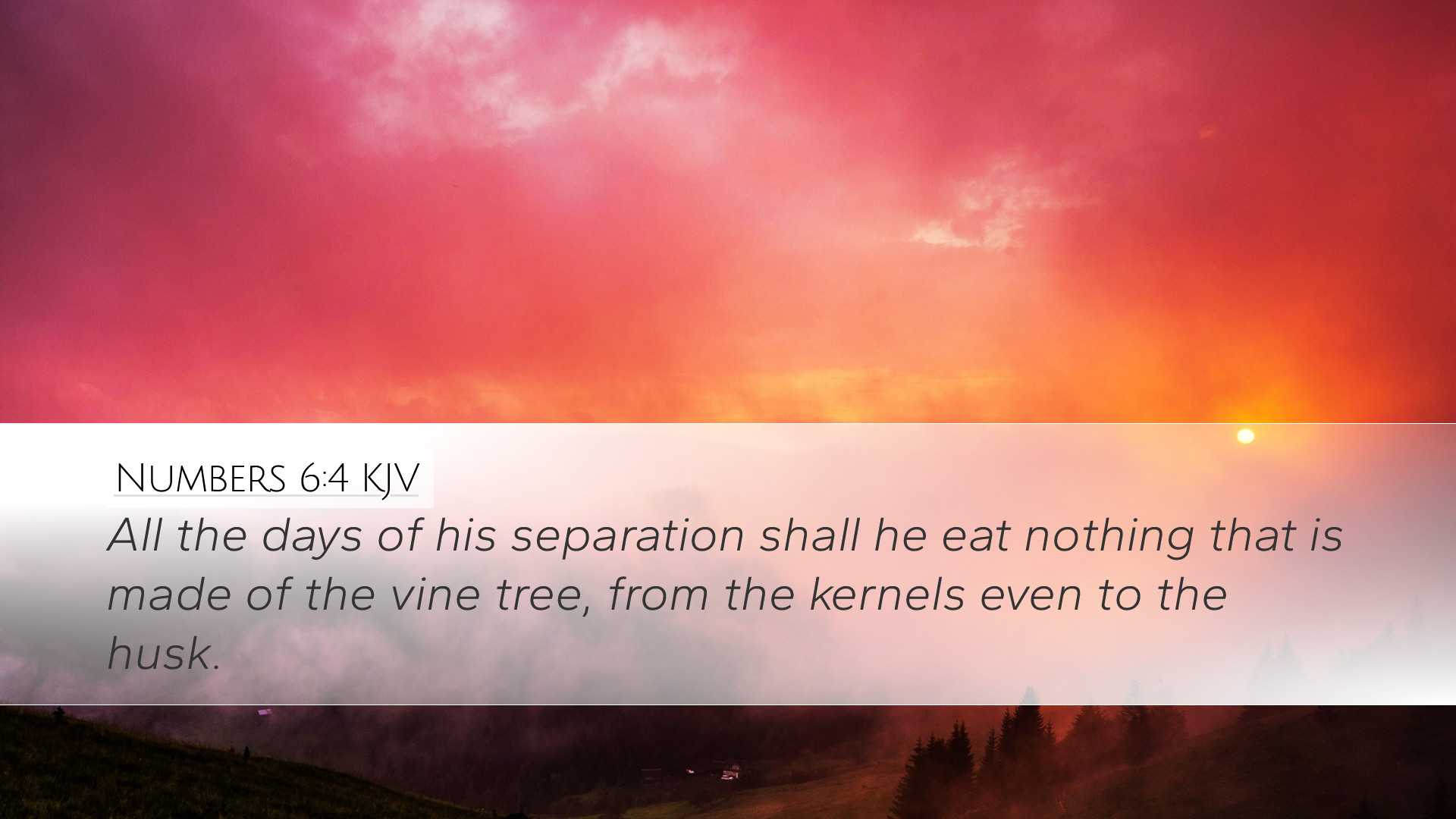Commentary on Numbers 6:4
Verse: Numbers 6:4 - "All the days of his separation shall he eat nothing that is made of the vine tree, from the seeds even to the husk."
Introduction
Numbers 6:4 is a critical verse within the context of the Nazirite vow, which delineates specific obligations concerning abstinence from certain things, signifying a period of consecration and devotion to God. This text has been explored with great depth by public domain commentaries, revealing its theological implications and pastoral applications.
The Context of the Nazirite Vow
The Nazirite vow outlined in Numbers 6 serves as a portrait of devout separation unto God. The term "Nazirite" comes from the Hebrew word "nazir," which means "to separate." This vow can be voluntary, reflecting a personal desire for deeper dedication to the Lord.
-
Matthew Henry's Commentary: Henry emphasizes that the Nazirite vow highlights a believer's commitment to holiness and separation from worldly influences. The abstention from the vine tree symbolizes the rejection of worldly pleasures and comforts, denoting a life wholly yielded to spiritual pursuits.
-
Albert Barnes' Notes: Barnes notes that the requirement to abstain from anything connected to the vine reflects the importance of maintaining purity during this time of separation. It serves as an indication of the seriousness of the commitment made by the Nazirite.
-
Adam Clarke's Commentary: Clarke explains that the Nazirite's abstinence applies from "the seeds even to the husk," suggesting a total renunciation of anything related to wine and grape products. This comprehensive prohibition illustrates the wholeheartedness of the commitment required for those taking the vow.
Theological Insights
At its core, the Nazirite vow is about holiness and dedication. The requirement to abstain from the vine tree serves as a metaphor for the greater biblical theme of separation from sin and worldly distractions.
-
Separation unto God: The Nazirite is called to live in a manner distinct from others as a demonstration of faith and obedience (Henry). This call to separation is not for self-improvement alone but as an act of devotion to the Lord.
-
Holistic Dedication: Each aspect of the Nazirite vow, including this prohibition, underlines the holistic nature of spiritual commitment (Barnes). It's not merely the abstention of external practices but a transformative internal process.
Pastoral and Practical Applications
For pastors and spiritual leaders, Numbers 6:4 challenges congregations to assess their commitments to God. It invites a reflection on personal practices and encourages the faithful to consider what they may need to abstain from in order to cultivate a closer walk with God.
-
Call to Holiness: Pastors can exhort their congregations to embrace lives marked by holiness, using the Nazirite vow as a contemporary parallel to choose sacrificial commitments that enhance one's relationship with Christ (Henry).
-
Encouragement in Trials: This verse can also serve as an encouragement for those facing trials or temptations, reminding them that their commitment to God will yield spiritual rewards and a deeper connection to His purpose (Barnes).
-
Teaching about Sacrifice: Church leaders can teach about the value of sacrifice and the importance of prioritizing spiritual discipline over worldly appetites (Clarke). A willingness to set aside comforts for sacred purposes is a key theme in Christian discipleship.
Conclusion
Numbers 6:4 encapsulates a profound aspect of spiritual life—separation for the sake of devotion to God. As believers embark on their faith journeys, the example of the Nazirite can inspire them to make bold, purposeful choices that glorify God and foster deeper spiritual growth.


